Dialect is a variety of a language which
prevails in a district, with local peculiarities of vocabulary,
pronunciation and phrase. England is a small country, yet it has many
dialects which have their own distinctive features (e.g. the
Lancashire, Dorsetshire, Norfolk dialects).
So dialects are regional forms of English.
Standard English is defined as the language as it is written and
spoken by literate people in both formal and informal usage and that
is universally current while incorporating regional differences.
Dialectal peculiarities, especially those of
vocabulary, are constantly being incorporated into everyday
colloquial speech or slang. From these levels they can be transferred
into the common stock, i.e. words which are not stylistically marked
and a few of them even into formal speech and into the literary
language. Car, trolley, tram began as dialect words. Some
examples of dialects:tha (thee) – the objective case ofthou; brass – money;nivver – never;nowt –
nothing.
Answer these
questions.
-
What determines the choice of stylistically
marked words in each particular situation? -
In what situations are informal words used?
-
What are the main kinds of informal words?
Give a brief description of each group. -
What is the difference between
colloquialisms and slang? What are their common features? Illustrate
your answer with examples. -
What are the main features of dialect
words?
Colloquial words. Examples with
translations (pp. 14-15)
p. 14 some
sort of
вроде бы в
put sb.
through доставать,
мучить
keep up
продолжать
cope with
справиться
stuff дело
chuck = give up бросить
a bad lot (old-fashioned) – a
dishonest personплохаярепутация,
дурнаяслава
knack
for backing = knack умение,
сноровка;
unlucky knack невезение;
back
the
wrong
horse
(idiom)
поставить
не на ту лошадь (т.е.
ошибиться, сделать
плохой
выбор, просчитаться)
landed
him in = to land sb in sth (informal)
– to
get sb into a difficult situation
bankruptcy court суд
по делам о несостоятельности
to
have a good time хорошо
проводить время
ups
and
downs
(of
fortune)
взлёты и
падения; превратности судьбы
damn
it
чёрт
возьми/подери
old
buffer
(bloke,
card,
codger)
(пренебрежительно)
старый
хрыч,
старикашка peg
out
выдохнуться,
выйти из игры
by
George!
Чёрт возьми!
Ей богу!
p.15
to
be through: She
was
through with
him – она покончила с ним
put
up:
1
поднять
– Put your hands up! 2
to
show a particular level of skill: The
team
put
up a great performance – played
very well
put
over передавать
Slang:
Examples (pp.
17-18)
Slang
сленг – это
разговорный или фамильярный стиль речи
в определённой области. Арнольд
И.В.: Слeнг
– сугубо разговорные слова и выражения
с грубоватой или шуточной эмоциональной
окраской, непринятые в литературной
речи.
once
in
a
blue
moon
phr.
в кои-то
века, раз в год по обещанию
white
elephant
обременительное
или
разорительное имущество;
обуза;
подарок,
от
которого не знаешь как избавиться
[король Сиама, желая разорить кого-либо
из
своих подданных, дарил ему священного
белого слона, содержание которого
обходилось
очень
дорого]:
Duddley doesn’t want the house, it always has been a
white
elephant.
your
tongue
has
run
away
with
you
вы не знаете,
что говорите; давать волю
своему
языку
dogs
(for
feet)
ноги; dog
более 20
значений в Oxford
Dictionary:
1 дрянь,
барахло
(о
товаре и т.п.); 2
халтура; 3
страшилище (о
женщине); 10
проститутка;
13
ступня
mug
(for
face)
–
рожа, морда
to
leg (for
to walk)
saucers,
blinkers (for
eyes)
– моргала
trap
(for
mouth,
e.g.
Keep
your trap shut! – Закрой хлебало!)
a
lid (for
a hat)
–
шляпа
a
nut (for
a
head)
–
голова
a
flipper (for
a
hand)
– рука
Соседние файлы в предмете [НЕСОРТИРОВАННОЕ]
- #
- #
- #
- #
- #
- #
- #
- #
- #
- #
- #
Слайд 2Dialectal words — are the variety of a language that a
group of people speak, separated either by geography, class, or ethnicity.
Dialects can be distinguished one from another by way of:
Grammar
Pronunciation
Syntax
Vocabulary
If there’s only a difference in pronunciation, this is just an example of different accents. Note also that dialect refers to a group of people; the specific speech patterns of an individual are called an idiolect.
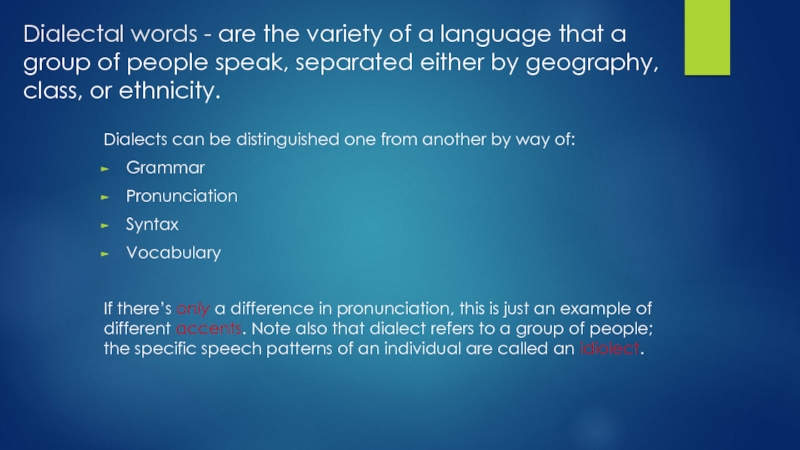
Слайд 3Dialectal words
Some dialectal words have become so familiar in standard colloquial
English that they are universally accepted as recognized units of the standard colloquial English
For example word lass meaning ‘a girl or a beloved girl’ and the corresponding lad, ‘a boy or a young man’
Dialectal words are only to be found in the style of emotive prose, very rarely in other styles.
And even here their use is confined to the function of characterizing personalities through their speech.
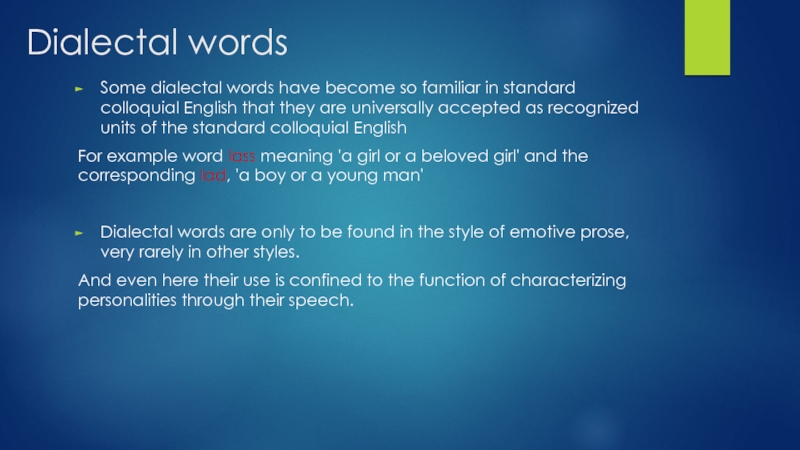
Слайд 4Dialectal words
Dialect, colloquialisms, and slang have much in common in that they all
refer to variations in speech patterns in a given language. Dialect refers to an entire set of linguistic norms that a group of people use. Colloquialisms are also generally geographic in nature, but refer to specific words or phrases that people of that region use. Thus, colloquialisms are an important part of distinguishing between dialects. Slang refers to terms that are used in specific social groups, such as for teenagers.
Try not to confuse them!
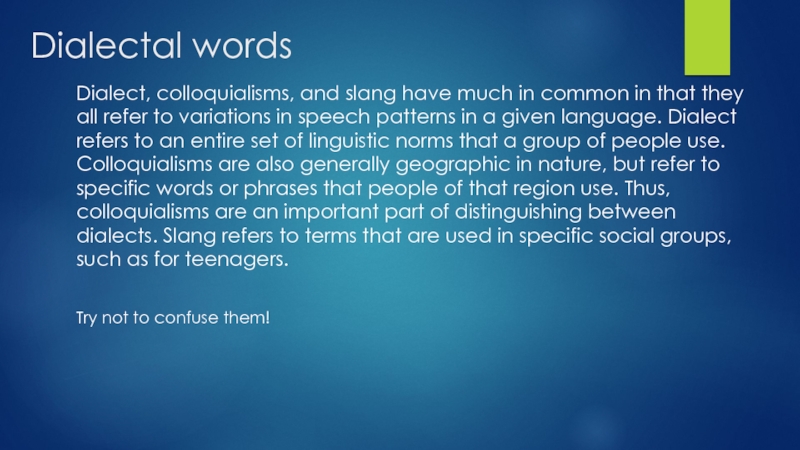
Слайд 5Dialectal words
Regional dialect
e.g British vs American
Class dialect
e.g Upper/MIddle/Lower class on a social
scale
Example of lower-class British English: «I ain’t»
Temporal dialect
e.g Whether a person belongs to an old or a young generation, to the sixteenth or twentienth century etc.
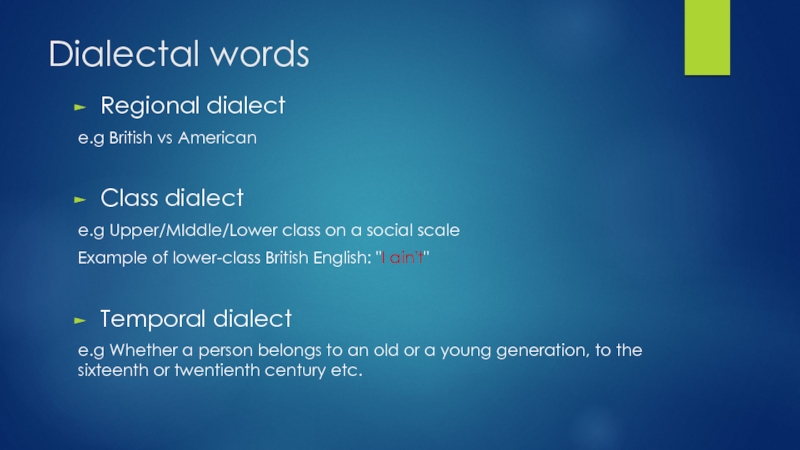
Слайд 6Old British Dialect Words to Incorporate into Conversation
DAUNCY: If someone looks
noticeably unwell, then they’re dauncy. Originally an Irish and northern English word, this eventually spread into colloquial American English in the 19th century. (Ireland)
FLOBY-MOBLY: The perfect word for describing the feeling of not being unwell, but still not quite feeling your best
WEATHER-MOUTH: A bright, sunny patch of sky on the horizon flanked by two dense banks of cloud is the weather-mouth. (Scots)
BANG-A-BONK: It might not look like it, but this is a verb meaning “to sit lazily on a riverbank.” (Gloucestershire)
ZWODDER: The last entry in the English Dialect Dictionary describes “a drowsy, stupid state of body or mind.” It’s probably related to another word, swadder, used to mean “to grow weary with drinking.” (SW England)
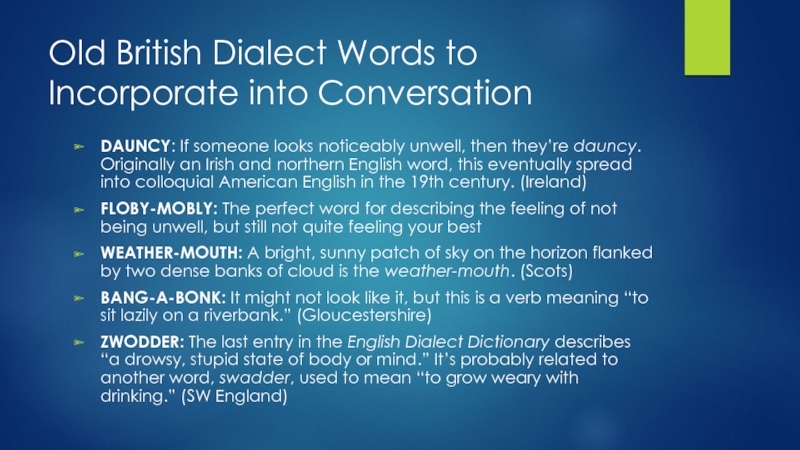
Слайд 7Modern British English dialectal words
Sing-small
This means “to put up with less
than was expected or promised”.(Essex)
Fella
The word “fella” refers to a man, either in the third person (“your auld fella” would mean “your father”, as in the more widely used “old man” to mean father), or directly, as in “you alright fella?” (city of Liverpool and its surrounding counties).
Chocka
This means “very busy” (as in “the station was chocka”) and it comes from the longer expression “chock-a-block”, which is actually of 19th century nautical origin and is heard more widely around the UK (city of Liverpool).
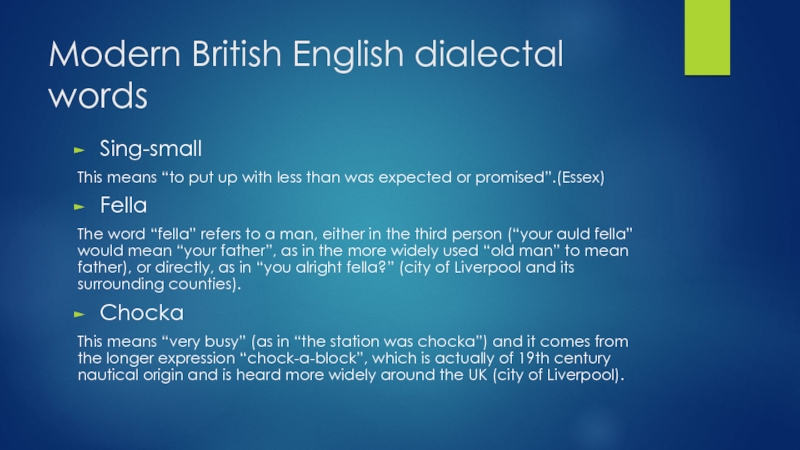
Слайд 8Geet Geet Geet walla
This simply means “very big”, as in “there’s
a geet walla tree in the road.”
Eee by gum
This essentially means “oh my God”, and it’s the phrase all non-Yorkshire people say when they want to replicate this distinctive dialect.
Oh aye?
This means “oh really?” and is generally an expression of surprise, that might be uttered with a raised eyebrow.
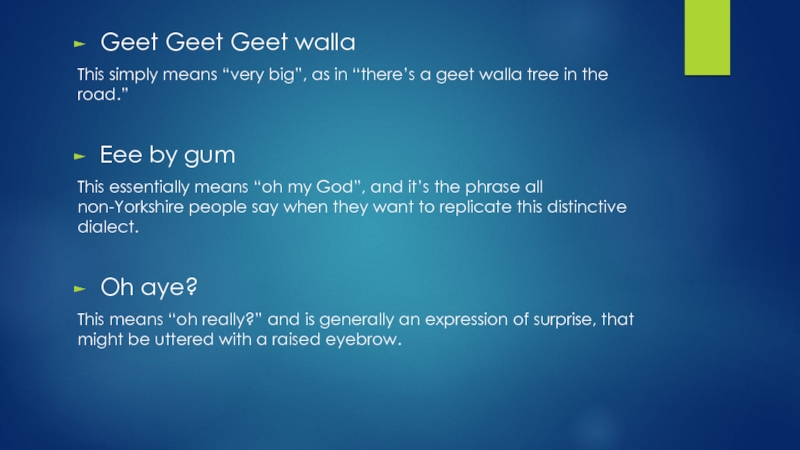
Слайд 9″Aussie» and «Murican» and Kiwi dialects
‘Ow ya goin’?
In the UK, we might
ask someone how they are by saying, “how are you doing?” In Australia, the equivalent expression is “‘ow ya goin’?” or “how are you going?”
Sheila
This woman’s name is used in Australia to refer to any female person.
Flipped Flipped Flipped out
This describes an angry reaction to something, as in, “He flipped out when I told him I was leaving.” (American)
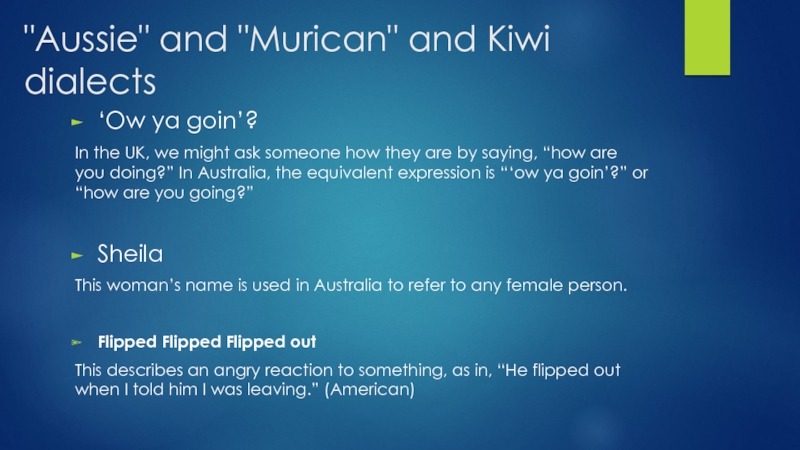
Слайд 10Megabucks
This means “a lot of money”, as in “he’s on megabucks
in his new job”, or “I couldn’t afford the laptop, it was megabucks.” (American)
Totaled
You can work out the meaning of this word from the context: “I totaled my car when I hit a tree”. It means completely wrecked, resulting in what we would call in the UK, “a write-off” – a car so badly damaged that the cost of repairing it exceeds the value of the car. (American)
Kia Ora
This is a Maori greeting meaning “hello”, but it’s common to see it around New Zealand used in an English context. (Kiwi)
Hard yakka
This is a way of saying “hard work”.
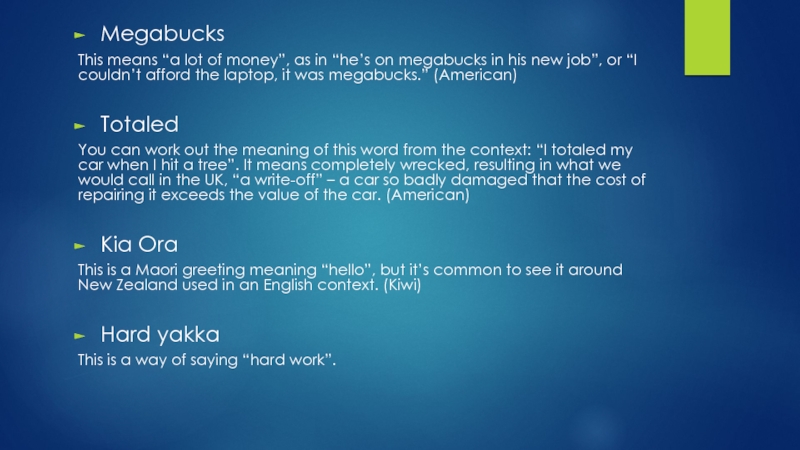
We recently discussed English slang, in the context of which we observed that there are numerous slang words found within specific regions of the UK and across English as it’s spoken in other countries.
Such is the variation that it can even give rise to misunderstandings between English-speakers. For example, an English person might say “I’m going to have a root in the wardrobe”, meaning that they’re going to hunt around in the wardrobe for something; but an Australian would laugh at this because to them, “root” is a rude word. Across the UK, a bread roll might be referred to in different regions as a “bun”, a “bap”, or a “barm cake”, among other things – all essentially the same thing, but referred to differently. It’s little wonder that those learning English as a foreign language have problems – so do native speakers! To demonstrate the enormous variety to be found in the way English is spoken in different parts of the country – and the world – we give you three illustrative words and phrases each from a selection of well-known English dialects.
Brummie/Black Country
We start with an accent that doesn’t have many fans in the UK. The Birmingham accent – part of the ‘Black Country’ dialect, which refers to the name given to this part of the Midlands, formerly ‘black’ from coal mining – is affectionately known as “the Brummie accent”.
“Round the Wrekin”
This saying is common in and around the Black Country, including the counties of Herefordshire, Worcestershire, Shropshire, Staffordshire and others. It refers to a prominent hill in Shropshire called “the Wrekin” – pronounced “REE-kin” – which can be seen for miles around. The phrase “round the Wrekin” simply means “to take the long way around”, which could refer to a long route taken when travelling somewhere, or to a long, rambling conversation that takes ages to get to the point.
“Bostin”
The word “bosting” (usually spelt and pronounced “bostin”) is used to describe something brilliant or excellent. It’s actually slang for “broken”, so it’s roughly akin to the general English term “smashing”, which isn’t fixed to a particular dialect.
“Babby”
This technically means “baby”, but you’ll probably find you’re addressed by Brummie folk as such (or by the shortening “bab” or “babs”). It’s a bit like the general word “dear”, as in “How are you bab?”.
Essex
The Essex accent is regarded as a milder form of the London accent, but this part of the country has also developed its own set of interesting words and phrases that people elsewhere in the country might not understand. It’s a dialect made famous – or infamous – by the television series The Only Way is Essex, with modern Essex sayings (used among the younger generation) including the vulgar “well jell”, which means “very jealous”. There’s more to Essex than this dreadful television show, however, and the phrases below preserve some older sayings from this county.
“Sing-small”
This means “to put up with less than was expected or promised”.
“Narrow-wriggle”
This brilliantly descriptive expression refers to an earwig, a kind of household pest.
“Liggle”
This refers to the act of carrying something that’s too big to be carried easily. Picture a small child trying to carry a growing, wriggling puppy, and you get the idea.
Scouse
The Scouse dialect is spoken in the English city of Liverpool and its surrounding counties. This distinctive dialect, characterised by its rising and falling tones and the use of “youse” instead of “you” as the second person pronoun, has an extensive vocabulary of slang, of which the following are some examples.
“Devoed”
This is an expression of negativity, broadly synonymous with the more widely used “gutted”. “Proper devoed” would mean “well and truly gutted”.
“Fella”
The word “fella” refers to a man, either in the third person (“your auld fella” would mean “your father”, as in the more widely used “old man” to mean father), or directly, as in “you alright fella?”
“Chocka”
This means “very busy” (as in “the station was chocka”) and it comes from the longer expression “chock-a-block”, which is actually of 19th century nautical origin and is heard more widely around the UK.
Geordie
Another highly distinctive UK dialect is known as “Geordie”, and it’s spoken by people in and around the north-eastern-English city of Newcastle-upon-Tyne and the larger Tyneside area.
“Pet”
This is simply an affectionate way of addressing someone, in the same way as the Brummie “babs”: “I know what yer mean, pet.”
“Geet walla”
This simply means “very big”, as in “there’s a geet walla tree in the road.”
“Haddaway”
This is generally used to express disbelief, in the same way as the widely used exclamation, “No way!” For example, a Geordie person might say, “Haddaway man, there’s nee [no] way he’s comin”.
Yorkshire
The Yorkshire accent is the archetypal Northern English one, and it’s characterised particularly by the shortening of “the” to a single “t” sound, as in “middle of t’road”, and by the dropping of consonants at the beginning of some words, such as “‘appy” instead of “happy”.
“Eee by gum”
This essentially means “oh my God”, and it’s the phrase all non-Yorkshire people say when they want to replicate this distinctive dialect.
“Oh aye?”
This means “oh really?” and is generally an expression of surprise, that might be uttered with a raised eyebrow.
“‘Appy as a pig in muck”
This refers to someone very happy or content.
Cockney
This dialect is traditionally spoken by London’s working class. We’ve already covered Cockney rhyming slang in our previous post on English slang, but this article would be incomplete without a mention of this notable English dialect. It’s so famous for its rhyming slang that it’s difficult to find examples of specific words that don’t arise from it; but they do exist, as these three examples show.
“Backhander”
This refers to an underhand payment, such as a bribe.
“Duck and dive”
The term “duck and dive” means hiding from trouble. If asked what they have been doing, a Cockney might respond by saying “duckin’ and divin’”, which is simply a non-committal answer that someone might give if they don’t wish to be specific.
“Luvverly jubberly”
Popularised by the sitcom “Only Fools and Horses”, the expression “luvverly jubberly” means that all is well.
West Country
The homely West Country accent has connotations of farmers and cider (a primarily Somerset stereotype), and when non-West Country folk want to replicate it, they say “ooh arr” (which means “oh yes!”, said when you’re pleased at something). For a good illustration of what the West Country accent sounds like, refer to the popular West Country band, The Wurzels.
“Alright me luvver?”
Translated as “are you ok mate?”, this is a form of greeting, and again is often used when mocking this accent.
“Teddies”
Another word for “potatoes”. In wider English vocabulary, a “teddy” is a toy stuffed bear.
“‘Ark a’ee”
This means “listen to him”, “‘ark” being short for “hark” and “ee” being a common substitute for “him” in the West Country dialect.
Welsh
Wales was a separate country before being incorporated into the United Kingdom, and as such, many of its inhabitants still speak the Welsh language. When speaking English, the Welsh have a pleasantly lyrical accent often described as “sing-song”, and there are a few words that are often referred to as “Wenglish” – a hybrid between Welsh and English. There are different dialects within Wales, such as the Cardiff dialect and the Valleys, but here are some of the more well-known words in general use in Wales.
“Butty”
In Wales, this word is often taken to mean a “mate”, and its usage differs from the wider English understanding of the word to mean “sandwich”, as in a “bacon butty”.
“Wanged out”
The expression “wanged out” (or just “wanged”) means “exhausted”. As in, “I’m going to bed, I’m wanged out.”
“Tidy”
In English as a whole, the word “tidy” means neat and ordered, but in Wales, it takes on a whole new meaning. As an exclamation, “Tidy!” means “splendid!”, while “a tidy few” would mean “quite a large number”, “a tidy spell” would be “quite a long time”, and “a tidy bit in the bank” would mean “quite a lot of money saved up in the bank”. There are lots more expressions along similar lines, too.
Glaswegian
While the Scottish accent in general is very popular with the rest of England, one particular Scottish dialect presents problems for English and other Scots alike. The thick Glaswegian dialect – spoken by those who inhabit the city of Glasgow (which, incidentally, recently voted ‘Yes’ to Scottish independence) – is notoriously difficult for non-Glaswegians to understand.
“Byraway”
This term is added to the end of sentences, particularly those in which a point is being made – “That’s mine, byrway”.
“Ah huvnae a scooby”
This expression is proof that it’s not just the Cockneys who have rhyming slang. This Glaswegian saying means “I haven’t a scooby”, which refers to the children’s cartoon character Scooby Doo – which rhymes with the word “clue”. So, the expression means “I haven’t a clue”, or “I don’t know”.
“Wur aw Jock Tamson’s bairns”
This essentially means “We’re all God’s children”, or, if “Jock Tamson” is seen as a personification of Scotland, “we’re all children of Scotland” – that is, “we’re all equal”. “Bairns” is a Scottish word for children, and Jock Tamson – also known as John Thomson – is thought to have been a 19th-century vicar who referred to his congregation as “ma bairns”.
Australian
Turning now to some examples of how English is spoken outside the UK, the ‘Aussie’ dialect is incredibly distinctive and often hard for English speakers from the UK to understand – beyond the ubiquitous “G’day mate!” greeting. English as it’s spoken “Down Under” has many words influenced by the native Aboriginal language, and plenty of its own.
“Barbie”
A “barbie” is a “barbecue” (not the Barbie dolls we’re used to in the UK!), a feature of Aussie life that forms a major part of how the Australians are perceived by other nations.
“‘Ow ya goin’?”
In the UK, we might ask someone how they are by saying, “how are you doing?” In Australia, the equivalent expression is “‘ow ya goin’?” or “how are you going?”
“Sheila”
This woman’s name is used in Australia to refer to any female person.
American
American English is often derided by UK English speakers, who sometimes see it as unnecessarily messing with the English language; the term “Americanism” is a derogatory way of describing a word or phrase originating in America that’s crept into use in UK English. As well as subtle differences in spelling (for example, Americans write “s” as “z” in some circumstances, such as “realize” instead of “realise”), there are numerous specific words and phrases that are unique to America.
“Flipped out”
This describes an angry reaction to something, as in, “He flipped out when I told him I was leaving.”
“Megabucks”
This means “a lot of money”, as in “he’s on megabucks in his new job”, or “I couldn’t afford the laptop, it was megabucks.”
“Totaled”
You can work out the meaning of this word from the context: “I totaled my car when I hit a tree”. It means completely wrecked, resulting in what we would call in the UK, “a write-off” – a car so badly damaged that the cost of repairing it exceeds the value of the car.
Kiwi
The New Zealand accent – commonly referred to as the “Kiwi” accent – sounds, to the untrained ear, rather like the Australian accent, though woe betide anyone who mistakes the two; a Kiwi would be offended to be mistaken for an Aussie! The Kiwi accent has shorter vowel sounds than the Australian accent, so the word “dead”, for example, would sound more like “did”. The New Zealand English dialect has influences from the native Maori tongue.
“Kia Ora”
This is a Maori greeting meaning “hello”, but it’s common to see it around New Zealand used in an English context.
“Hard yakka”
This is a way of saying “hard work”.
“Waiwai express”
This means “walking” – “we’re taking the Waiwai express to town” would mean “we’re walking to town”.
Оргина А.Д. 1
1Владимирский государственный университет имени Александра Григорьевича и Николаевича Столетовых
Текст работы размещён без изображений и формул.
Полная версия работы доступна во вкладке «Файлы работы» в формате PDF
This group of words is obviously opposed to the other groups of the non-literary English vocabulary and therefore its stylistic functions can be more or less clearly defined. Dialectal words are those which in the process of integration of the English national language remained beyond its literary boundaries, and their use is generally confined to a definite locality. Dialectal words are very powerful and common way of characterization, which elaborates the geographic and social background of any character. Dialects can be distinguished one from another by way of grammar, pronunciation, syntax, and vocabulary.
There is a definite similarity of functions in the use of slang, cockney and any other form of non-literary English and that of dialectal words. All these groups when used in emotive prose are meant to characterize the speaker as a person of a certain locality, breeding, education, etc.
There is sometimes a difficulty in distinguishing dialectal words from colloquial words. Some dialectal words have become so familiar in good colloquial or standard colloquial English that they are universally accepted as recognized units of the standard colloquial English. To these words belong “lass”, meaning “a girl or a beloved girl” and the corresponding “lad” – “a boy or a young man”, “daft” from the Scottish and the northern dialect, meaning of “unsound mind, silly”. Still they have not lost their dialectal associations and therefore are used in literary English.
Use of dialectal words can be found in “To Kill a Mockingbird” by Harper Lee: “Reckon I have. Almost died first year I come to school and et them pecans — folks say he pizened ’em and put ’em over on the school side of the fence.”Characters that are less educated and less sophisticated are usually shown to be speaking with a much stronger dialect.
There is sometimes a difficulty in distinguishing dialectal words from colloquial words. Some dialectal words are easily recognized as corruptions of standard English words, although etymologically they may have sprung from the peculiarities of certain dialects: hinny from honey; tittie apparently from sister; cutty meaning a “testy or naughty girl or woman”, fash with the meaning of “trouble, cares”. Scotland has struggled to retain the peculiarities of her language. Therefore, many of the words fixed in dictionaries as dialectal are of Scottish origin.
Dialects have phonetic peculiarity that distinguishes it from other dialect as mentioned above. In this example Mark Twain uses exaggerated dialect to distinguish between the characters. Jim: “We’s safe, Huck, we’s safe! Jump up and crack yo’ heels. Dat’s de good ole Cairo at las’, I jis knows it.” Huck: “I’ll take the canoe and go see, Jim. It mightn’t be, you know.” (“Huckleberry Finn” by M. Twain).
Dialectal words are found in the style of emotive prose, very rarely in other styles. And even here their use is confined to the function of characterizing personalities through their speech. The unifying tendency of the literary language is so strong that language elements used only in dialect are doomed to vanish, except, perhaps, those which, because of their vigour and beauty, have withstood the integrating power of the written language.
Writers who use dialectal words for this purpose in a piece of emotive prose or drama, introduce them into the word texture in different ways. Some writers make an unrestrained use of dialectal words and also slang, jargonisms and professionalisms, not only in characterization, but also in their narrative. Other writers introduce dialectal words which are understandable to the average English reader, or they make use of units which they think will enrich the standard English vocabulary. Dialectal words, unlike professionalisms, are confined in their use to a definite locality.
List of references:
Galperin I.R. English Stylistics. Moscow: USSR, 2014. 333 p.
Dialectal words. Definition. https://literaryterms.net/dialect/
Dialectal words. Definition and examples. https://literarydevices.net/dialect/
Dialectal words. http://www.literarydevices.com/dialect/
The lexical composition of the Russian language is diverse and very interesting. It has many original words, known only to a narrow circle of people. In lexicology, they are called limited in use and isolated in special groups. These include professional, obsolete and dialect words.
The latter can often be heard in rural areas. They exist mainly in lively spoken language and usually reflect the realities existing there. And for the name of the same subject, residents equally can use different options: and «local», commonly used.
Dialect word — what is it?
«There are herrings grazing behind the house.» Not many people, after hearing this phrase, will understand what is at stake. It is understandable. Selytkom in the Russian countryside is sometimes called a foal.
Dialecticisms are words that are actively used by residents of a certain locality and do not belong to any of the lexical groups of the literary language. Their distribution can be limited to a few towns or a whole region.
Interest in the «local» word in Russia arose in the 18th century. Since then, leading linguists and linguists, including V. Dal, A. Potebnya, A. Shakhmatov, S. Vygotsky and others, have done a great job in this direction. They considered various variants and examples of the use of the word dialect. In the literature both domestic and foreign this word today intersects with such concepts as linguistic geography (features of vocabulary in different territories), social dialectology (age, profession, social position of native dialects are taken into account).
Groups of dialects in Russian
In Russia, there are several variants of dialects. The basic principle of combining dialect words into groups is territorial. In accordance with it, the southern and northern dialects are distinguished, which, in turn, include several dialects. Between them are Central Russian dialects, which became the basis for the formation of the modern Russian language and therefore most closely approximated to the literary norm.
Each group has its own dialect words. Examples of their relationships (including common ones): home — hut (north) — hut (south); Speak — bait (north) — gutarit (south).
Formation of dialect words
Each dialect, as a rule, has its own distinctive features. In addition, it is customary in science to single out several groups, which include dialectal words that are different in form of education (examples are given in comparison with the norm).
- Actually lexical. They either do not have any connection with the words in the literary language (for example, the protein in the Pskov region is a vecher, the basket in the Voronezh region is a sapetka), or they are formed from the existing root and retain its basic meaning (in the Smolensk region: to bathe is to steam).
- Lexical and word-building. They differ from common words with only one affix: the poor man — on Don the trouble, the talkative — in Ryazan, talkative, etc.
- Phonemic. The difference from the existing literary norm is in one phoneme (sound): anduk instead of turkey, pahmurny — i.e. Cloudy.
- Osemantic. Completely identical to common words on sounding, writing and form, but differ in lexical meaning: running in the Smolensk region — nimble, noodles in the Ryazan region — the name of chicken pox.
Detailing life through dialect words
Many areas have their own peculiarities of everyday life, manners, relations between people, which are most often expressed in speech. To recreate the full picture of life in such cases can be through dialect words. Examples of words that highlight individual details in the general way of everyday life:
- Ways of laying sheaves of hay or straw (common name — baburka) in the Pskov region: malyanka — small stowage, large-sized otonek;
- The name of the colt in the Yaroslavl region: up to 1 year — a sucker, from 1 to 2 years — a snowdrop, from 2 to 3 years — a tuft.
The designation of ethnographic or geographical features
Another option — when dialect words (examples and meaning of them always cause interest in «outsiders») help to understand the very structure of life. So, in the north it is customary to build a house and build all the outbuildings under one roof. Hence a large number of «local» words denoting different parts of the same building: the bridge — the porch and the porch, the cottage — the living room, the ceiling — the attic, the tower — the living room in the attic, the sowing — the hayloft, the fat — the place in the cattle barn.
In the Meshchersky Region, the main economic sector is forestry. A large group of names is associated with it, which is formed by dialect words. Examples of words: sawdust — sawdust, needles — needles, cut down places in the forest — cutting, a person engaged in stump cutting, — peneshnik.
The use of dialect words in fiction
Writers, working on the work, use all available means to recreate the appropriate atmosphere and reveal the characters’ images. Dialect words play an important role in this. Examples of their use can be found in the works of A. Pushkin, I. Turgenev, S. Yesenin, M. Sholokhov, F. Abramov, V. Rasputin, V. Astafiev, M. Prishvin and many others. More often dialect words are addressed by writers whose childhood passed in the village. As a rule, authors themselves give footnotes containing the interpretation of words and the place of their use.
The function of dialectisms in a work of art can be different. But in any case they give the text uniqueness and help to realize the author’s idea.
For example, S. Yesenin is a poet, for whom the Ryazan dialect words are the main means of recreating rural life. Examples of their use: «in old-fashioned old shishun» — the look of women’s clothing, «at the threshold in the keg’s maid» — a wooden kettle for dough.
V. Korolenko uses local words when creating a landscape sketch: «I look … at the entrance» — the gorge. Or I. Turgenev: «the last … area (large thickets of bushes) will disappear.»
The so-called «village» writers are one of the ways to create a literary image — the speech of the hero, which includes dialect words. Examples: «take (God) you helped (helped)» by V. Astafyev, «they (they) … the earth will be worn out (spoil)» — in V.Rasputin.
The meaning of dialect words can be found in the dictionary: in the explanatory they will have a mark of obl. — Regional or Dial. — dialect. The largest special vocabulary is the Dictionary of Russian Folk Dialects.
The entry of dialectisms into the literary language
Sometimes it turns out that the word, once used by only a certain group of people, goes into the category of commonly used ones. This is a long process, especially in the case of «local» words, but it also takes place in our time.
So, it will not come to anyone’s mind that the well-known word «rustle» by origin is dialectal. This marks the mark of IS Turgenev in the «Notes of the Hunter»: «reeds rustled, as they say», i.e. In the Orel province. The writer’s word is used for the first time as onomatopoeia.
Or no less common — a tyrant, which in the days of A. Ostrovsky was dialectal in the Pskov and Tver provinces. Thanks to the playwright, it has acquired a second birth and today no one has any questions.
These are not isolated examples. On dialect words used to be like an eagle owl, a toy, a tack.
The fate of dialectal words in our time
In connection with the increase in recent years, migration processes within the country, the dialects are now spoken mainly by the older generation. The reason is simple — their language was formed in those conditions when the integrity of the people in certain regions of Russia was strong. The greater is the work of people who study dialect words, which today become one of the ways to study the ethnographic and cultural development, the identity of the Russian people, emphasize its individuality and uniqueness. For the modern generation it is a living memory of the past.
Dialect definition: A dialect is a form of a language that is specific to a particular region or group.
A dialect refers to a branch of a language. Within this branch, different terms are used for different things.
Dialects are usually formed around particular regions. However, they may also be used within certain groups of people.
For example, in The United States, there is a particular dialect in the Southern states. Within that Southern dialect, however, there may be subgroups who speak yet another dialect.
Foods are the most common terms to change within a dialect. What one dialect might call shrimp, another might call crawfish or crawdads.
Dialect vs. Accent

An accent is also specific to a region. In English, there might be an American, British, or Australian accent. An accent is an inflection that occurs with word pronunciation.
A dialect is entirely different words or ways of communicating altogether. Dialect goes beyond mere pronunciation.
Examples of Accent:
- An American might pronounce the word, “hello,” by speaking the “h” sound.
- A Brit might pronounce the word, “hello,” without speaking the “h” sound.
- This is still the same word, just spoken with a different accent.
Examples of Dialect:
- A Northern American might say, “hello.”
- A Southern American might say, “howdy.”
- This is an example of the differences in dialect.
American English Dialect Examples

Some of the more pronounced American regional dialects are the Northeastern (East Coast) and Southern dialects.
Someone from the East Coast might say, “What’s poppin’?” A Southern American would understand this, but would probably never say it.
Someone from the South might say,” How’r y’ll?” A Northeastern American would understand this, but probably never say it.
Example of Dialect in Literature

Authors want their characters to seem genuine; therefore, they must write dialogue between characters in such a way as they would speak it.
George Bernard Shaw’s Pygmalion does this well. A Cockney girl is “adopted” by a well-to-do gentleman who tries to change both her dialect and hear accent to Standard British English.
For many, this play is difficult to read because the Cockney is only specific to that region. However, if the play work not written with the Cockney dialect, it would not be effective at all.
Summary
Define dialect: the definition of dialect is a linguistic variety peculiar to a particular geographical region or used by members of a specific social class.
In summary, a dialect is a type of language that is spoken by a particular region or group of people.
Dialect is much more broad and far reaching that accent. Most dialects will include with them their own accents, but they are more than mere pronunciation differences.
Contents
- 1 What is Dialect?
- 2 Dialect vs. Accent
- 3 American English Dialect Examples
- 4 Example of Dialect in Literature
- 5 Summary
1. Dialectal words
2. Dialectal words — are the variety of a language that a group of people speak, separated either by geography, class, or ethnicity.
Dialects can be distinguished one from another by way of:
Grammar
Pronunciation
Syntax
Vocabulary
If there’s only a difference in pronunciation, this is just an example
of different accents. Note also that dialect refers to a group of
people; the specific speech patterns of an individual are called an
idiolect.
3. Dialectal words
Some dialectal words have become so familiar in standard
colloquial English that they are universally accepted as
recognized units of the standard colloquial English
For example word lass meaning ‘a girl or a beloved girl’ and the
corresponding lad, ‘a boy or a young man’
Dialectal words are only to be found in the style of emotive
prose, very rarely in other styles.
And even here their use is confined to the function of characterizing
personalities through their speech.
4. Dialectal words
Dialect, colloquialisms, and slang have much in common in that
they all refer to variations in speech patterns in a given language.
Dialect refers to an entire set of linguistic norms that a group of
people use. Colloquialisms are also generally geographic in nature,
but refer to specific words or phrases that people of that region
use. Thus, colloquialisms are an important part of distinguishing
between dialects. Slang refers to terms that are used in specific
social groups, such as for teenagers.
Try not to confuse them!
5. Dialectal words
Regional dialect
e.g British vs American
Class
dialect
e.g Upper/MIddle/Lower class on a social scale
Example of lower-class British English: «I ain’t»
Temporal
dialect
e.g Whether a person belongs to an old or a young generation, to
the sixteenth or twentienth century etc.
6. Old British Dialect Words to Incorporate into Conversation
DAUNCY: If someone looks noticeably unwell, then they’re dauncy.
Originally an Irish and northern English word, this eventually spread into
colloquial American English in the 19th century. (Ireland)
FLOBY-MOBLY: The perfect word for describing the feeling of not being
unwell, but still not quite feeling your best
WEATHER-MOUTH: A bright, sunny patch of sky on the horizon flanked
by two dense banks of cloud is the weather-mouth. (Scots)
BANG-A-BONK: It might not look like it, but this is a verb meaning “to
sit lazily on a riverbank.” (Gloucestershire)
ZWODDER: The last entry in the English Dialect Dictionary describes “a
drowsy, stupid state of body or mind.” It’s probably related to another
word, swadder, used to mean “to grow weary with drinking.” (SW
England)
7. Modern British English dialectal words
Sing-small
This means “to put up with less than was expected or promised”.(Essex)
Fella
The word “fella” refers to a man, either in the third person (“your auld
fella” would mean “your father”, as in the more widely used “old man” to
mean father), or directly, as in “you alright fella?” (city of Liverpool and its
surrounding counties).
Chocka
This means “very busy” (as in “the station was chocka”) and it comes from
the longer expression “chock-a-block”, which is actually of 19th century
nautical origin and is heard more widely around the UK (city of Liverpool).
8.
Geet
Geet Geet walla
This simply means “very big”, as in “there’s a geet walla tree in the
road.”
Eee
by gum
This essentially means “oh my God”, and it’s the phrase all nonYorkshire people say when they want to replicate this distinctive
dialect.
Oh
aye?
This means “oh really?” and is generally an expression of surprise,
that might be uttered with a raised eyebrow.
9. «Aussie» and «Murican» and Kiwi dialects
«Aussie» and «Murican» and Kiwi
dialects
‘Ow
ya goin’?
In the UK, we might ask someone how they are by saying, “how are
you doing?” In Australia, the equivalent expression is “‘ow ya
goin’?” or “how are you going?”
Sheila
This woman’s name is used in Australia to refer to any female
person.
Flipped Flipped Flipped out
This describes an angry reaction to something, as in, “He flipped out
when I told him I was leaving.” (American)
10.
Megabucks
This means “a lot of money”, as in “he’s on megabucks in his new job”, or “I
couldn’t afford the laptop, it was megabucks.” (American)
Totaled
You can work out the meaning of this word from the context: “I totaled my car
when I hit a tree”. It means completely wrecked, resulting in what we would
call in the UK, “a write-off” – a car so badly damaged that the cost of repairing
it exceeds the value of the car. (American)
Kia
Ora
This is a Maori greeting meaning “hello”, but it’s common to see it around
New Zealand used in an English context. (Kiwi)
Hard
yakka
This is a way of saying “hard work”.
